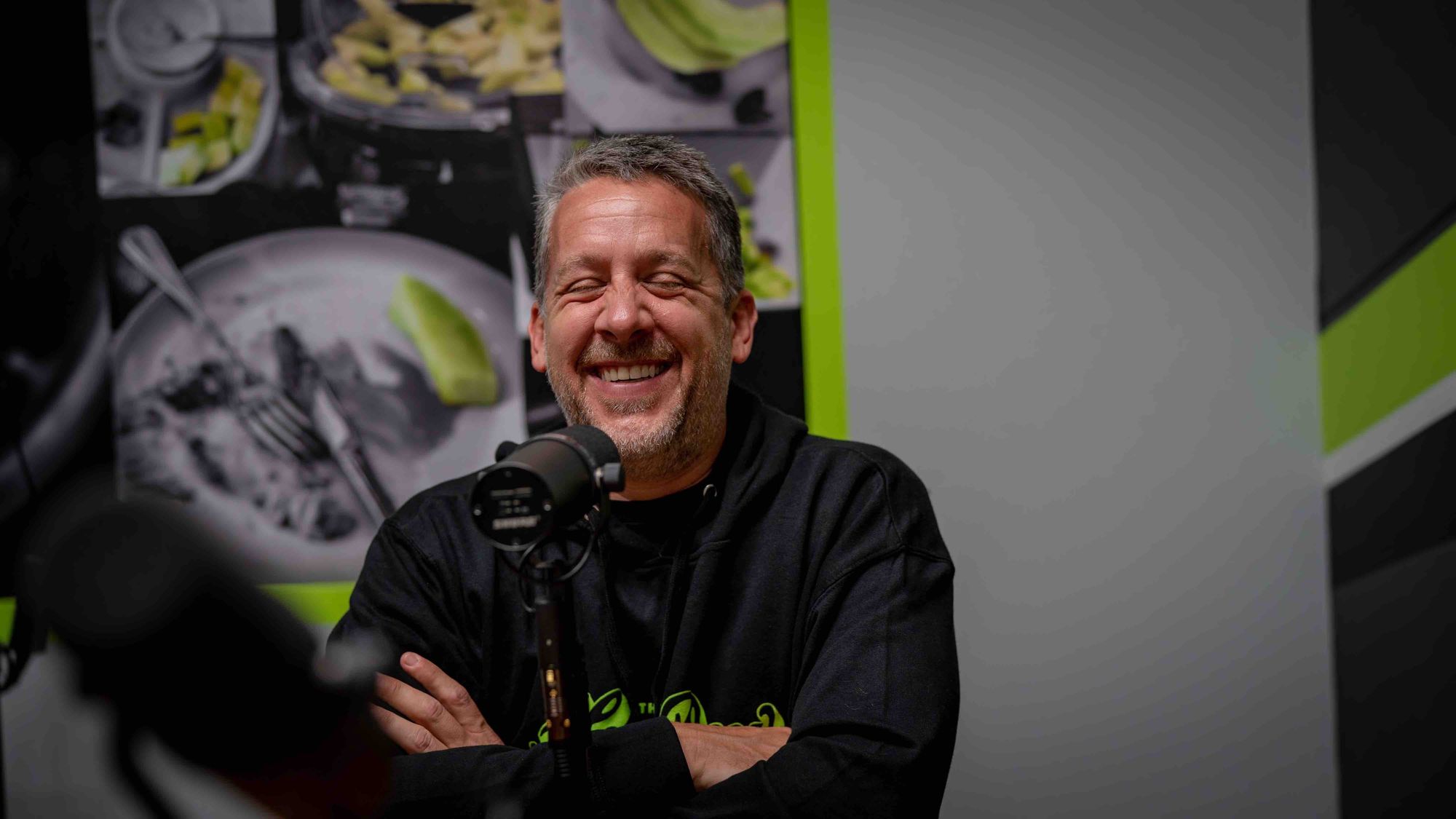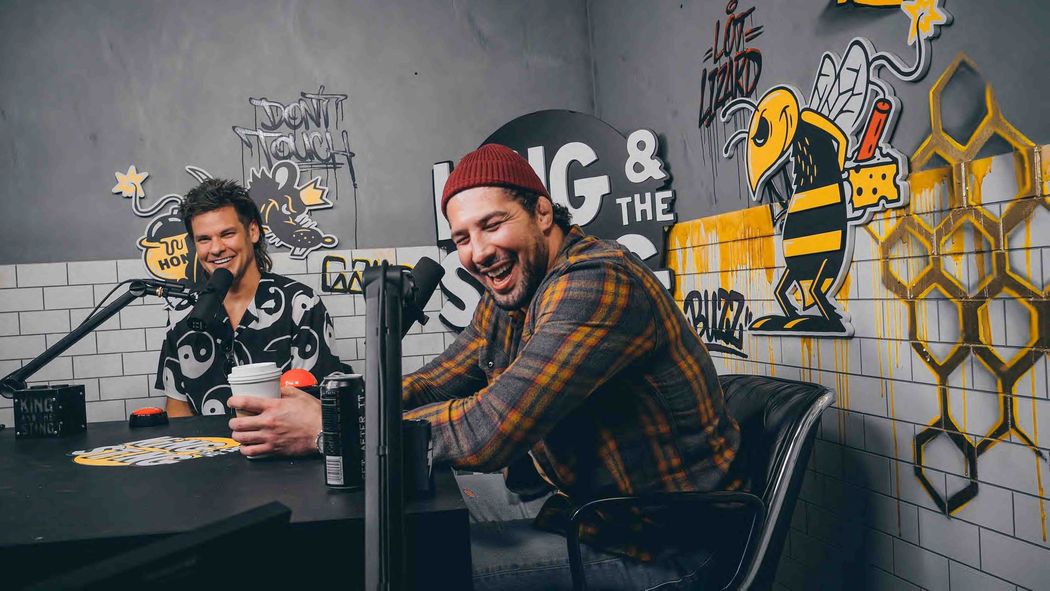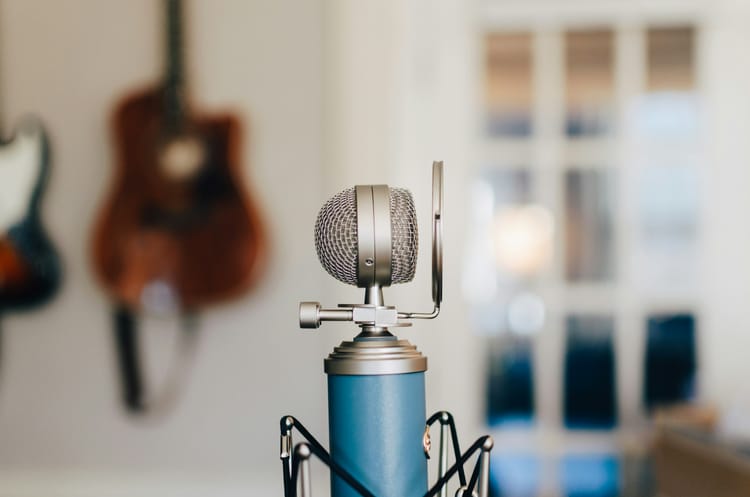Podcast intros set up the episode ahead. They should quickly tell audiences everything they can expect to hear or learn from your latest bit of content.
Done well, the listener should have a good idea of whether or not this particular episode is right for them. If it is, hopefully you’ll have intrigued them enough to stick around till the end.
If it isn’t for them, they’ll appreciate you being respectful of their time upfront. And they’ll be more inclined to check out your next episode as a result.
Recording helpful intros is simply good podcast etiquette. It’s about giving listeners clear and transparent information so they can decide whether your episode is worth the time investment.
So what does a good podcast intro sound like? What points do you need to get across? How long should it be? And how can you script them quickly? We’ve answered all these questions (and more) in this article.

Book Your Next Podcast Guest the Easy Way
With more than 70,000 members, MatchMaker.fm is the largest online community connecting podcasters & guests.
Join MatchMaker todayHow Long Should a Podcast Intro Be?
There’s no definitive answer on how long a podcast intro should be. It’s often dependent on how long your episodes are on the whole.
For example, if you produce longer than average episodes (the average being 36 minutes and 24 seconds), you’ll probably have more content to introduce than a show with shorter, 15-minute episodes would.
That being said, don’t drag your podcast intro out for the sake of it. They’re supposed to be short and snappy. So as a rule of thumb, don’t let your intros exceed 5 minutes in length, regardless of how long your episodes are. You want to get into the actual content quickly and start delivering on what your episode title promises.
As a rule of thumb, don't let your intros exceed 5 minutes in length
What Should a Podcast Intro Include?
If you can spark interest and intrigue during the first few moments after the listener hits play, they’ll be more likely to see it the whole way through. When writing your podcast intro, it’s generally a good idea to cover the 6 main points below.
1. Who You & Your Guests Are (If Any)
It might seem obvious, but introducing yourself and your guest(s) is the best way to kick off your podcast intro. Don’t assume your listeners already know - they might have landed on your show at random. So filling them in is a sure-fire way of building a good host-to-listener relationship. Who are you, and what do you do? Likewise, who is your guest? What have they done? And what credentials do they have?
The aim is to implicitly suggest to listeners why they should care about what you (or your guest) have to say about a particular topic. What qualifies you to host this show? And what qualifies your guest to be a good interviewee? Aim to communicate this as succinctly as possible. Don’t read off a laundry list of credentials and achievements. Focus on the most important ones.
2. Your Podcast’s Name
Another obvious one, but equally as important. Don’t forget to state the name of your podcast in the intro. Telling your audience what they’re actually listening to is helpful, especially if they’re driving or unable to check their phone. Again, keep it short and sweet.
3. A Memorable Tagline
Having a simple yet catchy tagline makes it easier for listeners to remember your show. It can be difficult to come up with something unique. So it’s worth taking a couple of hours to brainstorm ideas. The main thing you want to get across is a quick summary of who your show is for, and what they’ll get from listening.
To give you an example of an effective tagline, check out the one below. It belongs to The HoneyDew Podcast, a storytelling show hosted by comedian Ryan Sickler.
You guys know what we do over here - we highlight the lowlights. These are the stories behind the storytellers.
Key Takeaways:
- Tagline quickly sums up the goal and intent of the podcast as a whole
- It’s quick, concise, and snappy
- Juxtaposing language ("highlight the lowlights") is catchy and memorable
- Tells the listener exactly what they can expect from the episode ahead - the stories behind the people telling the stories

4. What’s the Problem? And How Are You Going to Solve It?
More often than not, your listeners will be coming to your podcast with a problem. Maybe a question they want an answer to, or something complex they don’t understand. It’s your job as the podcast host to identify what that problem is, and then solve it. Tell your listeners what they can expect to learn, and how you’re about to help them.
Obviously if you're producing a comedy podcast, the goal is not to solve problems or help listeners learn. In those cases, you want to tell listeners how you’re going to entertain them instead. What people, places, or things will you be poking fun at in this episode?
5. Call-To-Actions
Including a call-to-action during your podcast intro is key for driving people to your other platforms. Is there something specific you want them to do? It might be following you on social media, signing up to your newsletter, or leaving you a review, for example.
6. Music
The music you choose to accompany your podcast intro is important. It needs to effectively capture the tone of your show, and set the precedent for what themes lie ahead. We’ll go into the specifics of what you should be thinking about further down the page.
Putting It All Together
So what does it sound like when you piece together all 6 elements above in a cohesive and concise way?
The Huberman Lab podcast includes every one of the above points in his podcast intros. You can listen to an example below (intro ends at 13:55):
Podcast Intros: Optional Extras
Depending on the context of your show, you might also find the following 4 points useful to include in your podcast intro. If you’ve managed to score an episode sponsor, for example. Remember that these are just suggestions. They won’t be necessary for every podcast intro.
1. Teasers or Excerpts From the Episode Ahead
A good way of retaining more listeners is to add a teaser or snippet from the episode ahead into your podcast intro. If you pick wisely, it could persuade listeners to stick around and hear it in situ. It could be an interesting quote, an inspirational message, or just a funny exchange that took place between you and your guest.
2. Disclaimers (If Appropriate)
If your episode contains anything that could be deemed sensitive or unsuitable for young children (like swearing), it’s good practice to warn listeners in the podcast intro. You’ll just need to say something like - “please be advised that this episode contains explicit language”.
Including a disclaimer isn’t appropriate for comedy podcasts. Listeners generally know what to expect there. But if you’re producing an educational show with lots of swearing, it’s a good idea to give new listeners a heads up in the intro.
3. Sponsorship Information
This one will depend on the conditions of your secured sponsorship. Sponsors will more often than not want to be included in your podcast intro. They might send over a pre-approved message, or a list of key points about their service or product that they want you to cover. Either way, make sure you know exactly what’s required of you before recording.
4. The Episode’s Number & Title
Stating the episode’s number and title in your podcast intro can help listeners keep track of where they’re up to with your show. In addition, because 22% of podcast listeners tune in whilst driving, where they can’t look at their phone, dropping the episode’s number and title makes for a safer user experience.
How to Choose the Right Podcast Intro Music
Because music is both personal and subjective, picking the right theme song or jingle for your podcast intro can be a bit of a balancing act. There are 3 things that it should complement:
1. Your brand
2. Your podcast’s overall tone
3. Your (the host) voice
On top of that, it needs to be memorable and instantly recognisable. Powerful, but not distracting. Catchy, but not annoying.
Take some time to really sift through the various options on offer. Funky house? Heavy metal? Classical? It all depends on you and the kind of show you’re producing. Don’t rush into a decision. Your intro music is a key part of the brand you’re building.
Pre-Recorded Podcast Intros (+ Free Template)
If you don’t have the time to write and record a new podcast intro for every episode, you might want to think about pre-recording one. You’ll be able to use it over and over again, saving you a lot of hassle. But before you hop into the booth, you’ll need to draft up something quite generic. It might look like the below:
Hello! This is your host [insert host name], and welcome to today’s episode of [insert show name], a podcast all about [insert show premise]. To keep up-to-date with what’s coming up, be sure to follow me on Instagram @YourUserName and on Twitter @YourUserName. I hope you enjoy the episode, and let’s get straight into it.
The downside to recording a generic intro is that it won’t be as personal to the episode as a bespoke one would be. So if you’re an interview podcast with a different guest each time, this might not be the best strategy for you.
3 Great Podcast Intro Examples
Now that we’ve explored what a good podcast intro includes, it’s time to take a look at everything in action. We’ve picked out 3 podcast intro examples that work really well, and highlighted some key takeaways from each that you may want to implement in your own show.
Example #1: Anatomy of Murder
Hosted by Scott Weinberger and Anna-Sigger Nicolazzi, Anatomy of Murder (AOM) is a true crime podcast which dissects a different case file each week. Use the widget below to play the show’s introduction to one of their recent episodes.
Timestamps:
- 00:00-00:13 - Call-to-action directs listeners to the hosts’ Instagram accounts
- 00:14-00:46 - Theme tune and episode teaser
- 00:46-00:57 - Host introductions
- 00:58-01:05 - Show introduction & fade out of theme tune
- 01:05-02:20 - Guest introduction & teaser quotes
- 02:20-03:19 - Details of the episode’s subject
- 02:39-02:46 - Second call-to-action points to behind-the-scenes content
- 03:20-03:27 - Episode’s case file is introduced (podcast intro ends)
Key Takeaways:
- Behind-the-scenes AOM content is teased to drive traffic to social media accounts
- Clear call-to-actions are easy for the listener to follow
- Eerie theme tune sets the tone of the show & compliments the hosts’ voices
- Episode snippets effectively tease what’s to come, drawing listeners in
- Both hosts are clearly introduced (name, job title, experience, qualifications)
- The podcast’s name is stated early on
- Concise guest introduction tells the listener who and why, plus relevant info
- The scene is nicely set and the episode’s premise is smoothly introduced
- Natural and on-tone segues are used throughout
Example #2: Grounded with Louis Theroux
The Grounded with Louis Theroux podcast hears the host, Louis (journalist, filmmaker, broadcaster, and author), chat to a different high-profile guest every episode. Again, use the widget below to listen to one of the show’s introductions.
Timestamps:
- 00:00-00:05 - Production house is referenced (BBC Sounds)
- 00:05-00:07 - Host is first heard
- 00:07-00:22 - Theme tune plus host and show introductions
- 00:22-00:28 - Blooper
- 00:28-00:38 - Guest introduction
- 00:38-01:09 - Blooper continues
- 01:09-01:24 - Guest introduction continues
- 01:24-01:45 - Blooper continues plus the episode’s first host & guest interaction
- 01:46-01:54 - Episode’s premise explained
- 01:55-02:00 - Disclaimer, music fades out (podcast intro ends)
Key Takeaways:
- Clear production messaging promotes BBC Sounds
- Pleasant theme tune sets the light tone of the show
- Host’s welcome message creates a good host-to-listener relationship
- Host is clearly and quickly introduced
- Podcast’s name is stated for listener reference
- The show and episode premises are concisely set out from the start
- Funny blooper gives listeners behind-the-scenes content
- The guest’s introduction gives context and relevant background info
- Disclaimer warns listeners of bad language before the episode begins
- Smooth segue helps with the episode’s overall flow
Example #3: Global News Podcast from BBC News
The BBC’s daily Global News Podcast covers the top news stories of the day. Unlike the previous two examples, it doesn’t have a dedicated host, but instead, a few different ones. Despite this inconsistency, each episode’s introduction follows the exact same structure as the last. Have a listen to one of them below.
Timestamps:
- 00:00-00:04 - Show introduction & production information
- 00:04 - Theme music plays
- 00:04-00:12 - Host introduction, welcome greeting & episode premise
- 00:12-0:54 - Episode contents and teaser snippet
- 00:55-00:59 - Theme music fades out (podcast intro ends)
Key Takeaways:
- The podcast’s name is stated straight away
- Classic news channel jingle is recognisable and fits the show’s tone
- Host introduction tells the listener what they need to know
- Welcome greeting gets the episode off to a good start
- The date is stated for listener reference (important for news shows)
- Everything the episode will cover is referenced early on
- Daily headlines gives the listener useful context and unfolding updates
- Teaser snippet draws the listener in
- Smooth segue into the main episode
Want to hear more examples of good podcast intros? In the video below, MatchMaker founder, James Mulvany, breaks down the opening sequences of 3 more chart-topping podcasts:
So, What Makes a Good Podcast Intro?
Anyone can string a few sentences together and call it a podcast intro. But it takes a bit more thought and planning to write a good one.
Read your podcast intro draft out loud and have a think about the following questions. If you’re answering ‘yes’ to most of them, you’re on the right track. If not, try to rework it slightly so you’re hitting more of the desired criteria.
- Does it hook the listener in?
- Have I identified and communicated my target audience?
- Has the listener been addressed directly?
- Does it summarise the upcoming content?
- Does it capture the overall tone of the episode ahead?
- Can the listener get a good feel for my personality?
- Is it short, snappy, and concise?
If you’ve put a tick next to each point, you’re probably ready to incorporate it into your overall podcast script.

The #1 Podcasting Community
With more than 70,000 members, MatchMaker.fm is the largest online community connecting podcasters & guests.
Join MatchMaker today





